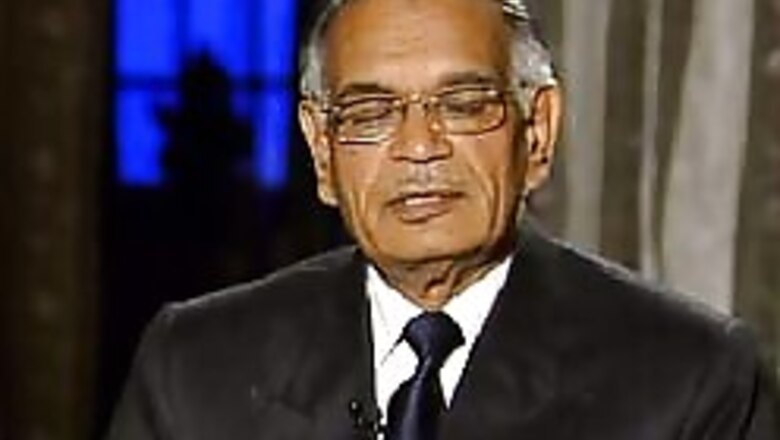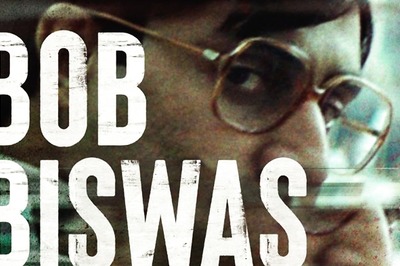
views
Karan Thapar: Hello and welcome to Devil's Advocate. Whether it's the phone-tapping controversy, India's insurgencies or the dissolution of the Bihar Assembly, my guest today is in the centre of all these issues. How does he manage to handle the incredible challenges that he has to deal with. In sense, that's the critical question that I should put today in an exclusive interview to the Union Home Minister, Mr Shivraj Patil.
Home Minister, let's start with the Bofors story that's dominating the news. As the Home Minister of India and as a former Speaker of the Lok Sabha, can you accept that the government's image is very badly damaged?
Shivraj Patil: Well, what the government has done is based on the facts collected by them. And if based on the facts, they take a decision, which is a very correct decision, it is very difficult to say. Because it will create some different public opinion. We should not take the incorrect decision.
Karan Thapar: In other words, regardless of what the public think about the defreezing of the Quattrocchi accounts, if it's the right thing to do, the government should have the courage to do it.
Shivraj Patil: I won't say in spite of the fact that the people think otherwise, it should have been done or it shouldn't have been done. I would say that in certain cases, the matter is pending for a long time. Investigations have taken place.
Different governments have been there, which have looked into the matter. And the officers working with them have collected information and the courts have given the judgments, acquitting the persons against whom allegations were made at some point of the other, the government which is in a position to take a decision, which is responsible for taking a decision, has to take a decision.
Karan Thapar: Let me quote what The Hindu - a paper that is usually very friendly to your government - has written: "Mr Quattrocchi has remained an accused under the Indian criminal system. Providing him assistance and unlocking his bank accounts is tantamount to subverting the cause of justice."
Shivraj Patil: Well, that is a judgment pronounced by one of our friends in the media. When we do respect the judgment of our friends and the media, well, we shall have to go by what is the legal position.
Karan Thapar: In that case, how to respond to the fact that every single newspaper in the country and increasingly many of your own allies are calling for the resignation of the Law Minister on the ground that he has transgressed his authority, that he has betrayed the trust of the Indian people in the criminal system?
Shivraj Patil: What the court says is more important. And what the court says is binding. And if somebody is saying that somebody is responsible without going into the facts, well we shall have to see whether it is correct or not. The facts which came to the notice, which were brought to the notice of the people later on, are quite contrary to the facts which were mentioned.
Karan Thapar: The problem here is that what the Law Minister has said is very different from what the director of the CBI first said. The director of the CBI first said that "Mr Quattrocchi remains an accused, that in fact he is someone we are still seeking to extradite." Yet, the very same day the Law Minister said that there is no evidence against Mr Quattrocchi and this has been conveyed to the British government. The two are saying two different things.
Shivraj Patil: I would not like to go into the details. Because the details are not available with me. Now, on this the CBI and those who have been dealing with this case are in a position to comment. I was replying to the general nature of the questions you had put to me. Details can come from those who have the papers with them.
PAGE_BREAK
Karan Thapar: So, on the general issue of the image of the government, you are saying to me as Home Minister that you don't think it suffered any damage?
Shivraj Patil: Well, it is a judgment which can be pronounced by individuals who are with some parties, individuals who are with us and individuals who are not with any shade of the political spectrum.
Karan Thapar: In other words, it's only individuals who say that the government has suffered. You don't believe people as a whole say this?
Shivraj Patil: How does it matter whether I believe or don't believe? What they do, let them do.
Karan Thapar: Well, that's true. That's a very laidback approach to take to people's individual opinion. Let's move to issues that are more directly linked to your portfolio as the home minister of India. Practically every single leading Opposition leader has begun to think that his or her phone is tapped. How seriously worried are you with this spate of accusations?
Shivraj Patil: Well, I don't think that is a fact.
Karan Thapar: What do you mean it's not a fact? Jayalalitha, Deve Gowda, Naidu, Badal, the Left, Mulayam Singh, Mamata Banerjee, Chandrababu Naidu, Amar Singh - they are all claiming that their phones are tapped.
Shivraj Patil: Have you heard the statement made by Mr Advani? He said, "I don't know whether my phone is tapped."
Karan Thapar: Venkaiah Naidu said it.
Shivraj Patil: What Venkaiah Naidu said is completely different from what Mr Advani says.
Karan Thapar: So you are saying these are unsubstantiated allegations?
Shivraj Patil: That means you will find the person whose phone is alleged to have been tapped is giving a different version from the person who has nothing to do with that phone.
Karan Thapar: What about Chandrababu Naidu, Badal, Mulayam Singh, Jayalalitha, Deve Gowda?
PAGE_BREAK
Shivraj Patil: I would not comment on what they have said because the comments which are brought to our notice, if you read carefully, they are completely different from what is said to have been said by the persons.
Karan Thapar: In other words, what they say to you in private is different from what they have said to the Press?
Shivraj Patil: No, that's not what I'm saying. What I am saying is, look you have mentioned a gentleman's name or a respected leader's name, but his version is different.
Karan Thapar: What about all the others?
Shivraj Patil: I shall have to know what exactly they have said.
Karan Thapar: I get the feeling you are not terribly concerned. So many people, many of whom are so senior, some of whom are former prime ministers and chief ministers, you are still not concerned that they are alleging phone are being tapped.
Shivraj Patil: I am not going to go into the details when I am talking to you in a limited period of time. If the matter is raised on the floor of the House, I will give a detailed reply. And I will quote what they have said and I will quote what are printed. And what are brought to my notice. And I will say give the quotation, give the information given by others also when we were not in power.
Karan Thapar: So it sounds as if you are saying I need proof, I want real details and only than will I move as a Home Minister.
Shivraj Patil: I am not expected to comment on things without going into the details. If I have to get any information, I will get the information from my own ministry, from the home ministries at the state governments and from others who are allowed to tap phones and than I will say whether they are making a correct statement or not. I am not saying anything against them.
Karan Thapar: What about those who are saying that this response is a very technical response? It suggests that you are indifferent and callous, you are careless and you are uncaring about a problem that they have brought about.
PAGE_BREAK
Shivraj Patil: Well, you can say anything you want to say. But, as a minister, I have to be correct. And factually, correct. Without collecting the information about what has been alleged and what has happened, if I make a statement saying yes it has been done or no it hasn't been done, I won't be correct.
Karan Thapar: At least two of your colleagues - the Law Minister and your deputy Sriprakash Jaisawal have said that the law needs to be changed. Do you accept that there is a need to look into the law?
Shivraj Patil: Well, this is a different issue. And even Mr Karat has also said something about the law and they system that is followed. That is something which has to be looked into.
Karan Thapar: Are you open to that?
Shivraj Patil: Well, this is something on which I won't say that I won't look into it.
Karan Thapar: Let me point to the instances where people are concerned about the law regarding phone tapping. Firstly, they say that the clause in the 1885 Telegraph Act that permits phone tapping in the interest of public interest is too vague. It needs to be tightened because it leaves it open to abuse.
Shivraj Patil: That can be examined on the floor of the House and if any improvement is required, will certainly do it. Anybody going to anybody's home, any filmstar's house, tapping his personal life and showing it - should it be allowed or not.
Karan Thapar: Before we confuse the issue, you are saying you are open to considering tightening of the law so that phone tapping becomes almost difficult?
Shivraj Patil: Definitely. If anything has to be done to protest the privacy and the reputation and the interest of any person, any association, any political party and at the same time in the interest of the country, which has to be done will be done.
Karan Thapar: What about Rule 419A of the Department of Telecommunication, which permits phone tapping for up to 15 days pending formal authentication? That rule actually caters for abuse.
Shivraj Patil: But you will also realise that many of the investigation which have taken place against the terrorists have been done with the help of conversation on phone.
Karan Thapar: It's the question of balance. A rule that helps you catch terrorists can also be abused in case of politicians.
Shivraj Patil: That is exactly what we will tighten. Those whose phones need to be tapped in the interest of the country, in the interest of security, in the interest of defending the country and defending the innocent persons' lives, it will be done. At the same time, there is the other side - it can be misused. If there is any scope for looking into it to ensure that this is not done, we will certainly be looking into it.
Karan Thapar: Many people will hear that and take heart for the fact that you are prepared to tighten the law to stop misuse.
Shivraj Patil: Tightening the law can also be misused, or loosening the law can also be misused. So I shall have to be correct. So I am saying that if there is any defect in the law, if any improvement is required to meet the technological development that have taken place, it should be possible. It's the duty of the Parliament and the government.
Karan Thapar: Let's then move to the decision to dissolve the Bihar Assembly, Which the Supreme Court declared unconstitutional. As the Home Minister of India, do you today accept responsibility for the fact that put not just the government but even the President in a highly embarrassing situation?
Shivraj Patil: Well, this is a matter which is before the Supreme Court. I am not expected to comment on a sub-judice matter.
Karan Thapar: It's not sub-judice. The decision has been given, the dissolution has been struck down. It's the explanation that should be done.
Shivraj Patil: It is a sub-judice matter. And what we did, well, according to our understanding, we did it. And on the basis of reports received by us and I think you have no reason to come to the conclusion that we had any bad intension.
Karan Thapar: Let me not question the intension because no one knows the intension. But as you said, you did it according to your reasoning. The Supreme Court has said that the decision was unconstitutional.
Shivraj Patil: I will not comment on the decision.
Karan Thapar: I am not asking you to comment on the decision. I am asking you to take responsibility for embarrassing the government.
Shivraj Patil: No, you can't make me say that I hold responsibility, or I am responsible or I am not responsible. You can't have that from me.
PAGE_BREAK
Karan Thapar: Can I put something? In a democracy, accountability is important. Who is responsible for the fact that a decision that was deemed to be unconstitutional was taken at midnight and the President was asked to sign it at 2 or 3 in the morning.
Shivraj Patil: That was discussed on the floor of the House. If necessary, it can be discussed on the floor of the House. All these things in which the decision was taken by the people of Bihar, the decision taken by responsible persons in Delhi and the decision taken by the Supreme Court are involved, in five minutes I am not in a position to comment this way or that way.
Karan Thapar: I want to put a simple thing to you. As a man of conscience and integrity and as a former Speaker of the Lok Sabha, do you have no conscience about the fact that as a Home Minister you are being responsible for the dissolution of an Assembly, which was deemed to be unconstitutional.
Shivraj Patil: How much you understand that these decisions are not taken in the ministry. These decisions are not taken by the Prime Minister. These decisions are taken by the Cabinet.
Karan Thapar: And the PM is the head of the Cabinet and Home Minister is an important part of the Cabinet and Governors come under you.
Shivraj Patil: Don't try to lead us in the area in which there will be difference between the PM and the ministers and the governor and the Supreme Court and the executive.
Karan Thapar: So, the people listening to this interview will conclude that Shivraj Patil as the Home Minister has no conscience about this decision.
Shivraj Patil: Well, that's your judgment. That's your understanding. You are at liberty and you have been saying it. You are behind our back. We are not complaining.
Karan Thapar: Mr Patil, let's start with some of the long-running insurgencies that you have to tackle. The Government of India has been talking to the Naga NSCN since 1997 and maybe as many as 50 rounds of talks have been held at that time. Are you nearing a solution?
Shivraj Patil: We have to understand that these talks have helped us maintain peace and tranquility in the area. And we are trying to take into confidence those people who had taken arms. And today, they are helping us to maintain peace and tranquility. This, to some extent, helps all of us. Now, exactly what they want and what can be given under the Constitution or in any other manner has to be looked into.
Karan Thapar: Can I point to what NSCN-IM head Muivah recently said? He said that the government is not focused on a solution. Its only interest is in extending one ceasefire to the next ceasefire. It has no vision beyond that. So, let me bluntly ask you do you have a roadmap for a solution?
Shivraj Patil: What do you suggest we have to do? Not to maintain law and order?
Karan Thapar: No, I am not talking about law and order. I am saying are you talking about the two critical issues that matter to the Nagas - special federal relationship with India and the integration of all Naga areas outside Nagaland and within Nagaland.
Shivraj Patil: Now, you are a responsible citizen of the country. I am a responsible citizen of the country. Have you understood the implications and impact of it - of doing it and not doing it, or giving an impression that we are not interested in looking into the matter? Or saying that we can do it?
Karan Thapar: But your attitude has led Mr Muivah to conclude that the talks are not serving any purpose. He has even gone on to say: "Now we're wondering whether it has been worth our while to come so far?"
Shivraj Patil: Well, that's your impression.
Karan Thapar: That's Mr Muivah's impression.
Shivraj Patil: Mr Muivah has been considering this matter for a pretty long time. And he understands the difficulties involved in it.
Karan Thapar: He says the talks are in danger of collapsing.
Shivraj Patil: No, we know more than anyone else what he says and what he doesn't say.
Karan Thapar: So, you think he's saying two different things?
Shivraj Patil: No, I am not saying that. I am saying that he understands the difficulties involved in it. And at the same time, he wants that what he wants should be given to him. At the same time, he is realistic enough and he's strong enough to pressurise those who can give him what he wants, in a manner which can be done.
Karan Thapar: Than let me ask you a blunt question. The Naga ceasefire ends on the 31st of January. Will it be renewed?
Shivraj Patil: Are you satisfied or not with the tranquility that has existed in that area for the 50 years?
Karan Thapar: It's not for me to express my personal opinion.
Shivraj Patil: Why not?
PAGE_BREAK
Karan Thapar: For the simple reason that my opinion doesn't matter. You are the home minister. Let me come back to the question I asked. Will the Naga ceasefire which expires on January 31 be renewed?
Shivraj Patil: I think it should be. But then, there are two parties to this agreement and depends on the attitude.
Karan Thapar: You don't sound very confident.
Shivraj Patil: Well, I am confident. Because I understand that ordinary human beings understand the realities, and they are peace and tranquility and not violence.
Karan Thapar: Will it be renewed for a full year or will it be renewed for just six months?
Shivraj Patil: I have no idea. We have constituted a Group of Ministers who are looking into it. And we have appointed an interlocutor and they are looking into it. And we are helping them. And we do think that we have created an atmosphere where there is no full agreement but there is understanding as to how to go about it.
Karan Thapar: Well, that's your version. But I have to point out for the sake of the audience that certainly what Mr Muivah seems to be suggesting recently to the Press is very different. Are you contesting it?
Shivraj Patil: I am not contesting. I am not opposing. I am not saying that he has not made that statement or he has made it. I am talking about my understanding of the situation and understanding of the manner in which the talks are going on.
Karan Thapar: Recently, you had a round of talks with Sajjad Lone. But four-and-a-half months have passed since you last spoke to Mirwaiz Umer Farooq and the All-Party Hurriyat Conference. You promised at that time to have a second round, it has not happened. Why not?
Shivraj Patil: You know, they spoke to the Prime Minister and I was also there. And I think the attitude adopted by them there was very good. They said 'we have made some proposals, please examine them and take proper action'. On some of the proposals, we have taken action. Now, there was a suggestion by other parties also that we don't talk only to a few individuals, a few parties. There are others also, we should talk to them. And the government said yes you are welcome to talk and that is why this process is going on.
Karan Thapar: But Minister, four-and-a-half months have passed since you spoke to Umer Farooq. You have not spoke to him against. You know what he is saying: The UPA government is not interested, the NDA was more committed.
Shivraj Patil: Well again, our understanding of their attitude and the manner of talking to us is completely different. Our understanding is they are talking to us in a responsible manner, and we appreciate it. We are continuing dialogues. There are others who say you hear us also. And we are doing it. I have myself spoken to nearly 20 groups and parties. The PM himself is speaking to some and this is continuing.
Karan Thapar: Can I point out what sections of the Press is saying? They are saying the only reason why the government is talking to Sajjad Lone is because they need to cut Mirwaiz Farooq down to size.
Shivraj Patil: I won't say the Press is trying to create conflict between the two parties.
Karan Thapar: But is the Press accurate in their suggestion?
Shivraj Patil: You have to judge it yourself.
Karan Thapar: Let me ask you this question. You called the All-Parties Hurriyat Organisation and Mirwaiz Farooq and promised a second round. Four-and-a-half months have passed, when will you call them?
Shivraj Patil: It's not like that. You know I have spoken to 20 groups in Delhi and more than 20 groups in Srinagar and Leh. The Prime Minister himself has spoken to these groups. The Prime Minister is taking an initiative and we are grateful to him. And we are all trying to see that an understanding and a better situation is created.
Karan Thapar: You are not answering my question. My question is very simple. Will you invite them?
Shivraj Patil: I have not drawn my appointment chart. When it is drawn, it will be brought to your notice.
Karan Thapar: It doesn't sound if it is going to happen in the near future.
Shivraj Patil: Well, that's your assessment. It can happen, it may not happen. Depends on their availability of time and my time and Prime Minister's time.
Karan Thapar: Are you serious about the internal track - talking to your own people in Kashmir? Because you are progressing very slowly.
Shivraj Patil: You don't know what was the progress made in bringing down violence in J&K. You have not asked me this question. Now, the situation has improved so much.
Karan Thapar: All the reason for holding talks with people like Mirwaiz Farooq.
Shivraj Patil: That is exactly what we are doing. That is what we have been saying that we will do.
Karan Thapar: I want to focus the last questions on you personally. More than me you must be aware of the fact that for the last six months people in Delhi have been whispering about your future. They have been saying that you may or may nor continue as Home Minister. Does this sort of speculation concern and worry you?
Shivraj Patil: Well, if you are doing your duty, why should you worry about it. And ultimately, it's for the leader to decide. It is not for anyone else to decide. And what has been done is before everybody. If the situation in J&K has improved, if the Northeast has improved, even the situation in the Naxalite areas has improved. If you have done properly with tsunami and you have been able to do it, that should give you satisfaction. If you have committed a mistake, you should be unhappy about that. But why should we keep on speculating what is going to happen?
PAGE_BREAK
Karan Thapar: Can I ask you this? Are you satisfied with your performance is the last 20 months?
Shivraj Patil: If I says I am satisfied, you will say you are praising yourself. If I say dissatisfied, you will say you are not confident. Do you expect me to give you a judgment about myself?
Karan Thapar: Have you done the best job you could have done?
Shivraj Patil: This is exactly what you are asking me to judge myself and say that "Oh, I did so well. Or Oh, I didn't do well." It is for you to judge.
Karan Thapar: Then my last question: If in 5, 10 or 15 days the Prime Minister is going to ask you to step down as Home Minister, would you stay on in Cabinet or would you prefer to leave the Cabinet altogether?
Shivraj Patil: Is it a fair question to me or my Prime Minister or to my leader? And you expect me to reply to this kind of question.
Karan Thapar: How should I interpret that?
Shivraj Patil: I don't know. You have to decide yourself. You said you are talking to the Home Minister. You expect the Home Minister to reply to questions of this nature?
Karan Thapar: Home Minister, thank you very much to speaking to Devil's Advocate.




















Comments
0 comment